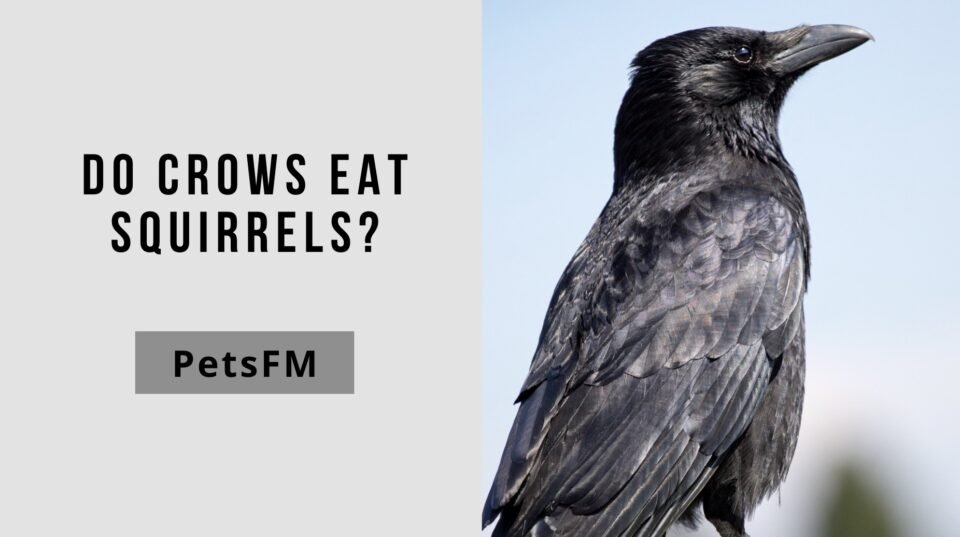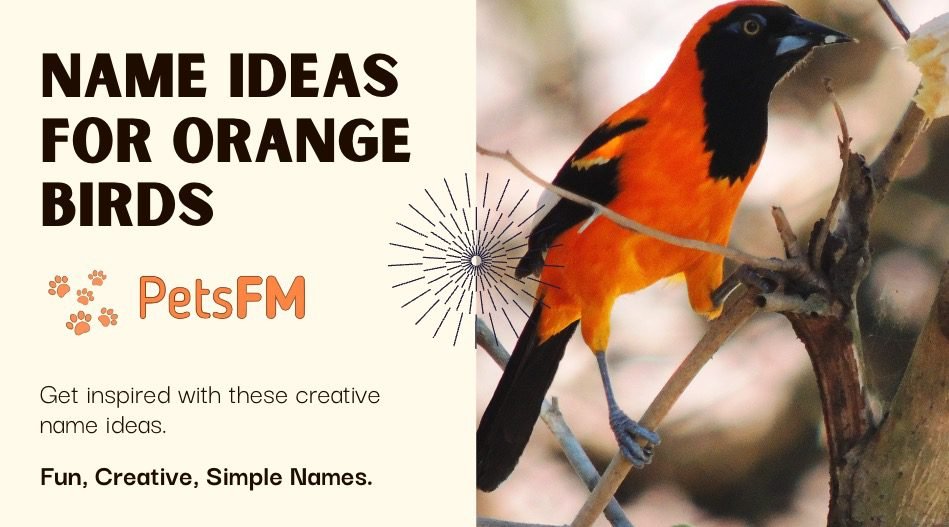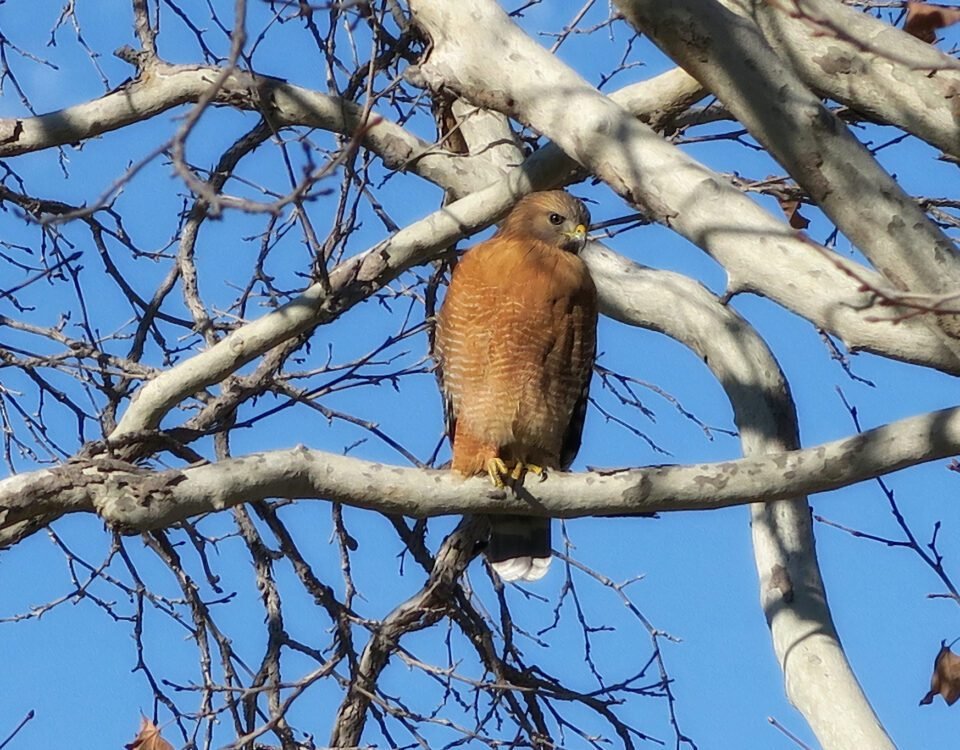


All You Need to Know About Feeding Almonds to Birds
January 4, 2024


Are Birds Warm-Blooded or Cold-Blooded? [2024 Guide]
January 4, 2024Yes, crows can eat squirrels. These birds often opt for the path of least resistance when it comes to their meals, usually feeding on deceased squirrels or targeting young squirrels left unguarded by their parents. As opportunistic feeders, crows tend to prefer easier options for sustenance, which means they are more likely to consume squirrel carrion or juveniles rather than attempting to pursue an adult squirrel.
This article sheds light on the predatory habits of crows. It reflects the complex dynamics within our ecosystems, making it a subject of great interest for wildlife enthusiasts and nature observers alike.
Understanding The Dynamics of Crows & Squirrels
Crows are known for their remarkable intelligence and adaptability. They exhibit a varied diet, including fruits, insects, seeds, and small animals, showcasing their omnivorous nature.
Crows are also noted for their problem-solving skills and complex social structures, often gathering in large groups.


American Crow
On the other hand, squirrels, predominantly tree-dwellers, play a crucial role in their ecosystems. Their activities contribute to forest health through the dispersal of seeds and nuts.
These agile creatures primarily feed on nuts, fruits, and seeds, and their presence indicates a healthy, balanced environment. Understanding these two species provides insight into their potential interactions and the balance of nature.
The Relationship Between Crows and Squirrels
In the wild, the interaction between crows and squirrels is a fascinating display of nature’s complexity. Crows, with their keen intelligence and adaptability, are often observed monitoring the activities of squirrels, especially in shared habitats.
This observation is a testament to the crows’ opportunistic nature, as they always look for potential food sources.
Predatory behavior in crows towards squirrels is uncommon, mainly when easier food sources are scarce. Crows prey on young or vulnerable squirrels, capitalizing on moments when these smaller mammals are unprotected.
This behavior is part of the natural ecological balance, where crows are both scavengers and predators, contributing to controlling the squirrel population. Understanding this interaction provides a deeper appreciation of different species’ roles in maintaining the equilibrium of their shared environments.
Why Crows Go After Squirrels?
First, it’s all about what’s on the menu and how easy it is to get. When their usual food is hard to come by, crows aren’t shy about switching things up. Squirrels, especially the young or the not-so-quick ones, can become an unexpected lunch option.
Crows are intelligent and always watch for an easy meal. They’re like the ultimate opportunists of the bird world – if there’s a chance to grab a bite with minimal fuss, they’ll take it. And sometimes, that means targeting squirrels.
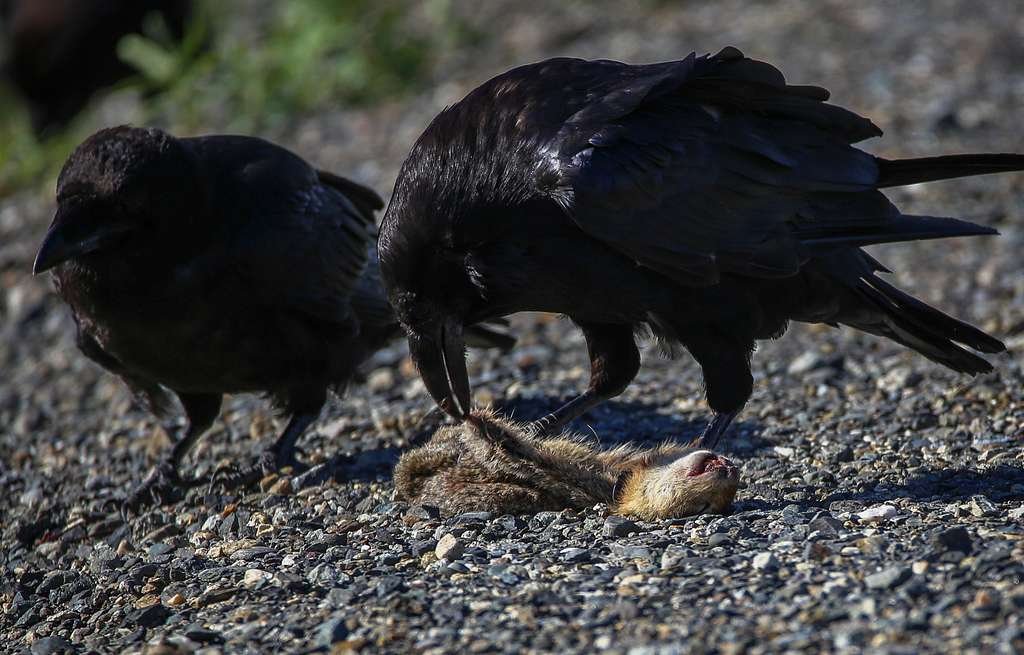

Ravens Eating a Squirrel
And let’s not forget, squirrels are a pretty nutritious catch. They’re packed with protein and fats, like energy gold for these birds. This is super important for crows, especially when they need extra energy – like during colder months or raising their young.
So, while it seems harsh from the squirrel’s perspective, it’s just nature’s way of keeping things balanced for crows.
How Crows Consume Squirrels?
The way crows consume squirrels involves several steps, showcasing their adaptive and calculated approach to feeding. Initially, crows engage in careful observation, identifying potential targets.
They often opt for younger or more vulnerable squirrels, considering the ease of capture.
Upon selecting a target, crows exhibit strategic behavior. They may employ tactics like distraction or teamwork, where one crow diverts the squirrel’s attention while another strikes. This strategy underscores their intelligence and collaborative hunting skills.
Once a crow successfully captures a squirrel, it immobilizes it, usually through pecking and clawing. This can be challenging, especially if the squirrel is fully grown and vigorous in its defense.
The consumption phase sees the crow focusing on the most nutritious parts of the squirrel. They typically start with the softer, more accessible areas, such as the abdominal region. Crows prioritize parts rich in fat and protein, maximizing their energy intake.
In cases where the squirrel is too large to be consumed in one sitting, crows may practice food caching. They store parts of their catch in hidden spots for later consumption, ensuring a food supply for future needs.
Do Crows Eat Dead Squirrels?
Yes, crows do eat dead squirrels. As opportunistic feeders, crows are not only adaptable in their diet but also in their feeding strategies. They consume a wide range of food, including carrion, which is the flesh of dead animals. Finding and eating a deceased squirrel provides a significant energy source with minimal effort, making it an ideal choice for crows.
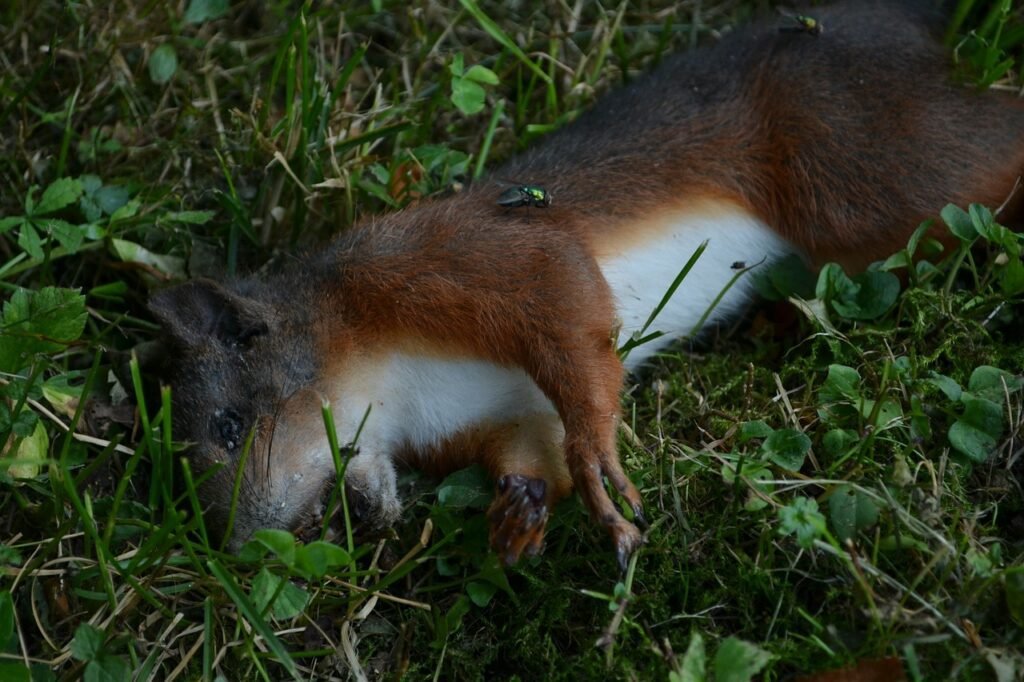

Dead Squirrel
The consumption of carrion is a natural part of many ecosystems and plays a crucial role in the cycle of life. Scavengers like crows help to clean up the environment by consuming dead animals, thus preventing the spread of disease and contributing to the ecological balance.
When Is The Best Time For Crows to Eat Squirrels?
To observe a crow preying on a squirrel, your best bet is to head to wooded areas or parks where both species are common, especially during early mornings or late afternoons. These are times when crows are most active in their search for food.
Additionally, when food sources are scarcer in early spring or late fall, such sightings become more likely as crows may turn more towards opportunistic feeding, including preying on squirrels.
Are Squirrels Scared Of Crows?
Yes, squirrels generally exhibit a sense of wariness or fear towards crows. This cautious behavior stems from the predatory nature of crows, especially towards young or vulnerable squirrels.
Squirrels are instinctively alert to potential threats, and the presence of crows, known for their opportunistic feeding habits, triggers their survival instincts.
This results in squirrels being on high alert, quickly retreating to safety, or exhibiting defensive behavior when crows are nearby.
Which Other Birds Eat Squirrels?
Several bird species are known to prey on squirrels, particularly large ones with strong predatory instincts. Some of these birds include:
- Hawks: Many hawk species, such as the Red-tailed Hawk and Cooper’s Hawk, are well-equipped to hunt squirrels due to their powerful talons and keen eyesight.
- Eagles: Larger birds of prey like the Bald Eagle and Golden Eagle can also hunt squirrels, although they typically prefer larger prey.
- Owls: Owls, especially larger ones like the Great Horned Owl, are effective nocturnal predators that can catch squirrels.
- Falcons: Some falcons, such as the Peregrine Falcon, can catch squirrels, though they generally prefer birds.
- Goshawks: The Northern Goshawk, a larger member of the Accipiter genus, is known for its agility in wooded areas, making it capable of hunting squirrels.


Hawks Claws
What Do Crows Feed On Other Than Squirrels?
Crows have a highly varied and opportunistic diet, feeding on various items beyond squirrels. Some of the common foods in a crow’s diet include:
- Insects and Small Invertebrates: They eat various insects, worms, and other small creatures, especially during warmer months.
- Seeds and Grains: Crows often feed on seeds, grains, and nuts, foraging in agricultural fields or areas with natural vegetation.
- Fruits and Berries: They consume various fruits and berries, depending on what’s available seasonally.
- Small Animals and Carrion: Besides live prey like squirrels, crows eat carrion (dead animals) and might catch small mammals, amphibians, or reptiles.
- Eggs and Nestlings: They are known to raid the nests of other birds for eggs and nestlings.
- Human Food Waste: Crows are common in urban areas, where they readily exploit garbage, compost, and other sources of human food waste.
- Fish: Crows may also feed on fish or other marine organisms in coastal or riverine areas.
Conclusion
In conclusion, the dynamic between crows and squirrels offers a captivating glimpse into nature’s complexity. From the adaptive diets of crows, including their occasional predation on squirrels, to the complex interplay of survival instincts, these interactions highlight the delicate balance in our ecosystems.
Understanding this relationship deepens our appreciation of nature’s intricacies and highlights the importance of maintaining ecological harmony without human interference.
